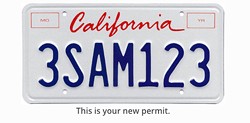Cal Poly's Transportation and Parking Services (TAPS) is launching a license plate recognition software that will be fully implemented by fall 2019, with the goal of eliminating parking permits.
Matt Lazier, a Cal Poly spokesperson, said students would register their license plate and vehicle make and model into the online parking system when purchasing their virtual parking permits. The license plate recognition software then combines this information with the individual's payment and generates a virtual permit linked to that vehicle's license plate number.

- Screenshot Photo Taken From CalPoly.edu
- PERMITLESS Cal Poly's commitment to zero waste has moved it in the direction of virtual parking permits starting Fall 2019.
"Transportation and Parking Services employees will be equipped with scanners that read license plates on parked cars and indicate whether a vehicle is parked legally, allowing for efficient enforcement throughout the university's parking lots," Lazier said.
The license plate number will automatically get checked in the database to verify the permit and whether the vehicle is in the right parking lot. If the license plate isn't associated with a valid virtual permit or if the vehicle is parked in an unauthorized location, the vehicle will receive a citation. The cost for the fall 2019 student virtual permits hasn't yet been finalized, but Lazier said the new program won't affect the prices.
Resident and commuter students will have a chance to choose their preferred parking lot with a lottery that begins on Aug. 16. Students put their name on waitlists based on the lot priority they choose. Each lot will be awarded via lottery and the students will have a deadline to purchase. Any remaining permits are issued via lottery until all of the permits are sold.
Lazier said the system technology and equipment will cost $116,000, but TAPS spends about $60,000 per year on plastic permits, third-party mailing of permits, and administrative costs to process and replace lost and stolen permits.
"These costs will be reduced and eventually eliminated with virtual permits," he said.
The university also anticipates that customer service will be improved, as the software will simplify and streamline the permit purchase and renewal processes. Guest parking won't change; the option to use the mobile parking system for meters and event areas or purchasing permits at campus pay stations will still be available.
Cal Poly got on board with the technology because it reduces waste in accordance with the university's commitment to zero waste and campus sustainability.
"It eliminates disposal of expired and unused plastic permits. It reduces paper, envelopes, and ink used in permit production and distribution. It reduces delivery of permits and postage," Lazier said. Δ
Comments